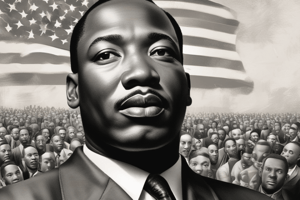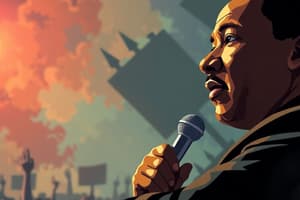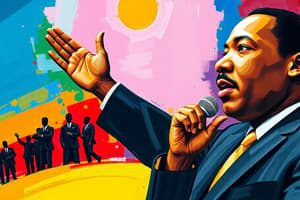Podcast
Questions and Answers
What was Martin Luther King Jr.'s significant contribution to the civil rights movement?
What was Martin Luther King Jr.'s significant contribution to the civil rights movement?
- He founded the NAACP.
- He was an influential orator who galvanized support. (correct)
- He led armed protests against segregation.
- He developed educational programs for African Americans.
How did King’s leadership style differ from militant black separatists?
How did King’s leadership style differ from militant black separatists?
- King believed in a single strong leader for the movement.
- King endorsed non-violence, while some preferred different approaches. (correct)
- King rejected the idea of leadership altogether.
- King advocated for armed resistance.
Which event is highlighted as a memorable moment in Martin Luther King's leadership?
Which event is highlighted as a memorable moment in Martin Luther King's leadership?
- The Birmingham Campaign.
- The Selma to Montgomery marches.
- The Montgomery Bus Boycott.
- The March on Washington. (correct)
What perception did King's assassination create regarding the non-violent movement?
What perception did King's assassination create regarding the non-violent movement?
What was the reaction of some activists towards the idea of King as a singular leader?
What was the reaction of some activists towards the idea of King as a singular leader?
What misconception about King’s leadership continues to persist?
What misconception about King’s leadership continues to persist?
What aspect of King's leadership was particularly enhanced by television?
What aspect of King's leadership was particularly enhanced by television?
Which quote reflects a common view shared by King’s supporters in private?
Which quote reflects a common view shared by King’s supporters in private?
What factor contributed to King's selection as the leader of the Montgomery bus boycott?
What factor contributed to King's selection as the leader of the Montgomery bus boycott?
Which strategy did King recognize as necessary to effectively challenge segregation?
Which strategy did King recognize as necessary to effectively challenge segregation?
What lesson did King learn from the Birmingham campaign regarding the White House's potential intervention?
What lesson did King learn from the Birmingham campaign regarding the White House's potential intervention?
What challenge did King face during the Albany protests in 1962?
What challenge did King face during the Albany protests in 1962?
How did King approach the leadership of the Birmingham campaign differently than Albany?
How did King approach the leadership of the Birmingham campaign differently than Albany?
What dual approach did King take as a leader in advocating for racial justice?
What dual approach did King take as a leader in advocating for racial justice?
What was a significant factor in King's emergence as a prominent leader in the civil rights movement?
What was a significant factor in King's emergence as a prominent leader in the civil rights movement?
How did King's experience in Albany impact his strategies in future campaigns?
How did King's experience in Albany impact his strategies in future campaigns?
What local goals did the leader limit his campaign to?
What local goals did the leader limit his campaign to?
What tactic did the leader use to attract media attention during the campaign?
What tactic did the leader use to attract media attention during the campaign?
Why did the leader decide to end the campaign in May 1963?
Why did the leader decide to end the campaign in May 1963?
What was the perception of some African Americans towards the leader's organization, the SCLC?
What was the perception of some African Americans towards the leader's organization, the SCLC?
How did the brutal treatment of protesters affect the political landscape?
How did the brutal treatment of protesters affect the political landscape?
What difficult issues did the leader champion after 1965?
What difficult issues did the leader champion after 1965?
What does the content suggest about the leader's legacy in comparison to his earlier work?
What does the content suggest about the leader's legacy in comparison to his earlier work?
What was one of the consequences of the leader's ability to wind down campaigns?
What was one of the consequences of the leader's ability to wind down campaigns?
What did Martin Luther King believe was essential for leadership?
What did Martin Luther King believe was essential for leadership?
How did King's approach to leadership differ from that of other race leaders?
How did King's approach to leadership differ from that of other race leaders?
What was one major aspect of King's leadership style during the civil rights movement?
What was one major aspect of King's leadership style during the civil rights movement?
What challenge did King accept after 1965?
What challenge did King accept after 1965?
Which quality made King stand out among other leaders in the civil rights movement?
Which quality made King stand out among other leaders in the civil rights movement?
Who was primarily responsible for planning the Montgomery bus boycott?
Who was primarily responsible for planning the Montgomery bus boycott?
How was Martin Luther King Jr.'s approach to leadership perceived by the Student Nonviolent Coordinating Committee (SNCC)?
How was Martin Luther King Jr.'s approach to leadership perceived by the Student Nonviolent Coordinating Committee (SNCC)?
What did King spurn in his final campaigns?
What did King spurn in his final campaigns?
What characteristic of King’s background influenced how he was perceived as a leader?
What characteristic of King’s background influenced how he was perceived as a leader?
What effect did King's 'Messiah' complex have on his leadership?
What effect did King's 'Messiah' complex have on his leadership?
What was the main perception of King among white citizens after the Watts disturbances?
What was the main perception of King among white citizens after the Watts disturbances?
Which organization launched the freedom rides of 1961, distinct from King’s SCLC?
Which organization launched the freedom rides of 1961, distinct from King’s SCLC?
What change did King advocate for in response to the riots and poverty?
What change did King advocate for in response to the riots and poverty?
What was a key challenge faced within the black community that Martin Luther King Jr. addressed?
What was a key challenge faced within the black community that Martin Luther King Jr. addressed?
How did King’s anti-war stance affect moderate African-American figures?
How did King’s anti-war stance affect moderate African-American figures?
In private meetings, how did Martin Luther King Jr. typically contribute to discussions?
In private meetings, how did Martin Luther King Jr. typically contribute to discussions?
What new direction did organizations like SNCC and CORE take in 1966?
What new direction did organizations like SNCC and CORE take in 1966?
What was one reason African American support for King was weak?
What was one reason African American support for King was weak?
Why did violent disorder attract more attention from the establishment than King's non-violent protests?
Why did violent disorder attract more attention from the establishment than King's non-violent protests?
How did some moderates hope King would react to the riots?
How did some moderates hope King would react to the riots?
What did King’s critics believe about his leadership during this period?
What did King’s critics believe about his leadership during this period?
Flashcards
King's Leadership
King's Leadership
Martin Luther King Jr.'s leadership style was more than just oratory; it involved inspiring and organizing people for civil rights.
I Have A Dream Speech
I Have A Dream Speech
A powerful speech delivered at the 1963 March on Washington, it galvanized support for civil rights.
Non-violent Movement
Non-violent Movement
A movement advocating for civil rights through peaceful methods.
Diverse Leadership
Diverse Leadership
Signup and view all the flashcards
The 'Great Leader' Myth
The 'Great Leader' Myth
Signup and view all the flashcards
Bipartisan Coalition
Bipartisan Coalition
Signup and view all the flashcards
March on Washington
March on Washington
Signup and view all the flashcards
Black Separatists
Black Separatists
Signup and view all the flashcards
King's Non-violent Approach
King's Non-violent Approach
Signup and view all the flashcards
Montgomery Bus Boycott
Montgomery Bus Boycott
Signup and view all the flashcards
Civil Rights Movement Leaders
Civil Rights Movement Leaders
Signup and view all the flashcards
King's Leadership Style
King's Leadership Style
Signup and view all the flashcards
King's Role in Movement
King's Role in Movement
Signup and view all the flashcards
Factionalism in Black Community
Factionalism in Black Community
Signup and view all the flashcards
SNCC and Freedom Rides
SNCC and Freedom Rides
Signup and view all the flashcards
King's Leadership Limitations
King's Leadership Limitations
Signup and view all the flashcards
Opposing Views on Leadership
Opposing Views on Leadership
Signup and view all the flashcards
King's Impact beyond Speeches
King's Impact beyond Speeches
Signup and view all the flashcards
King's Later Campaigns
King's Later Campaigns
Signup and view all the flashcards
Enduring Legacy
Enduring Legacy
Signup and view all the flashcards
King's Dilemma
King's Dilemma
Signup and view all the flashcards
White Backlash
White Backlash
Signup and view all the flashcards
Black Power Movement
Black Power Movement
Signup and view all the flashcards
King's Anti-War Stance
King's Anti-War Stance
Signup and view all the flashcards
Moderate African Americans' Criticism
Moderate African Americans' Criticism
Signup and view all the flashcards
Violent Disorder's Impact
Violent Disorder's Impact
Signup and view all the flashcards
FBI's Role
FBI's Role
Signup and view all the flashcards
King's Legacy
King's Legacy
Signup and view all the flashcards
King's Pragmatism
King's Pragmatism
Signup and view all the flashcards
King's Influence on Presidential Decisions
King's Influence on Presidential Decisions
Signup and view all the flashcards
King's Criticism from African Americans
King's Criticism from African Americans
Signup and view all the flashcards
King's Approach to Campaign Ends
King's Approach to Campaign Ends
Signup and view all the flashcards
Selma's Impact on Congressional Agenda
Selma's Impact on Congressional Agenda
Signup and view all the flashcards
King's Post-1965 Advocacy
King's Post-1965 Advocacy
Signup and view all the flashcards
King's Courage to Challenge
King's Courage to Challenge
Signup and view all the flashcards
King's Advocacy for Wealth Redistribution
King's Advocacy for Wealth Redistribution
Signup and view all the flashcards
Birmingham Campaign
Birmingham Campaign
Signup and view all the flashcards
Albany Campaign Failure
Albany Campaign Failure
Signup and view all the flashcards
Economic Pressure
Economic Pressure
Signup and view all the flashcards
King's Birmingham Strategy
King's Birmingham Strategy
Signup and view all the flashcards
Civil Disobedience & Image
Civil Disobedience & Image
Signup and view all the flashcards
Moral Suasion & Concessions
Moral Suasion & Concessions
Signup and view all the flashcards
Study Notes
Martin Luther King Jr.'s Leadership Style
- King's leadership was more than just being prominent; it was about eloquent communication and effective organizing.
- He was a captivating speaker, particularly with the "I Have a Dream" speech.
- King rallied support for civil rights legislation through activism.
- His leadership inspired many, but also encountered internal challenges and debate about his approach.
The "Great Leader" Myth
- King's leadership was heavily influenced by the media portrayal, particularly television.
- This portrayal presented his leadership as primarily oratorical, rooted in inspirational speeches.
- However, King's approach was multifaceted, encompassing private meetings, negotiations, and dealing with diverse opinions.
King's Leadership in Action
- King's leadership was more than just speeches. It involved listening, synthesizing ideas, resolving disputes, and ensuring unity.
- He was adept at mediating tensions within the movement.
- He used non-violent actions to pressure decision makers to change and for social progress.
- He led movements, but not necessarily alone. His followers played crucial roles and developed strategies.
King's Non-violent Approach
- King's supporters privately recognized that non-violence wasn't universally adopted.
- Critics both within and outside the movement questioned if non-violence was the optimal strategy.
- King's approach drew from the teachings of earlier civil rights leaders and activists.
Challenges to King's Leadership
- External and internal challenges impacted his credibility and leadership. The Albany campaign in 1962 presented a challenge of leadership.
- Not all activists supported King; some favored more aggressive strategies.
- King was sometimes perceived as prioritizing his public image over addressing other issues.
- Misunderstandings and distrust arose between different factions in the movement.
King's Legacy
- King's ability to bring people together was critical to his success.
- His non-violent approach was a turning point in the fight for civil rights.
- He recognized the need to combine moral suasion with pressure tactics.
- His willingness to challenge the status quo and seek dialogue with opponents was instrumental.
Studying That Suits You
Use AI to generate personalized quizzes and flashcards to suit your learning preferences.





